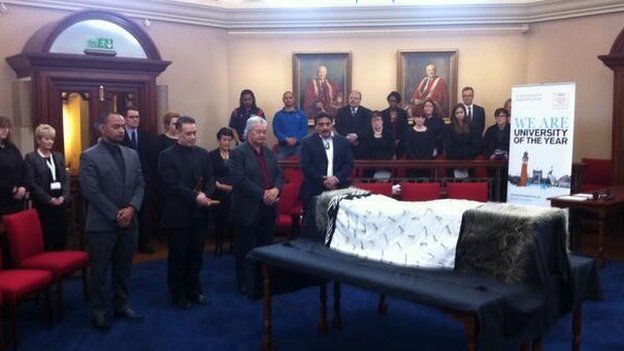Birmingham Maori head returned to New Zealand
- Published

A tattooed Maori preserved head and skeletal remains are being returned from Birmingham to New Zealand.
The ancestral items were discovered in the anatomy department at the University of Birmingham.
Staff contacted the Museum of New Zealand Te Papa Tongarewa about the remains, which had been in storage.
A traditional funeral ceremony was held at the university and the remains were given to Maori delegates for their return to Wellington.
Arapata Hakiwai, co-leader of the New Zealand museum, said the ceremony was important "for the elders to tell the ancestors they're going to journey home soon".
Te Herekiekie Herewini, manager of the repatriation programme, said: "In our beliefs your spirit and life force comes from the particular part of the country you're from.
"It's important for your life force to go back to that place. Repatriation allows both sides to reconcile their histories."
University staff said the toi moko (preserved head) and koiwi tangata (skeletal remains) had not been used or displayed and their presence at the university was a mystery.
'Treat with dignity'
Dr June Jones, from the College of Medical and Dental Sciences, said: "We have no records about how these items came to be in storage at the university, but when they were uncovered we knew we had to give them back.
"We believe that to keep them would be wrong.
"They belong back with their own people, to be treated with the dignity and respect they deserve."
She apologised directly to the Maori delegates and said the paperwork that accompanied the items was believed to have gone missing during renovations at the medical building over the last century.
"It's most likely from Victorian times when we had a lot of wealthy people in Birmingham. Collecting heads was an activity, a hobby, for some men.
"Relatives, when they realised they were skulls, maybe gave them to the medical school."
She described the collecting of remains from other cultures as an "example of one historical practice we're deeply ashamed of".
The handover was arranged as part of the museum's repatriation programme, which has managed the return of more than 100 items since 2003.
It said more than 400 items were believed to still be in the UK, based on records kept by museums and other sources.
In total, eight toi moko and five koiwi tangata will be collected from institutions in the UK and Ireland this month.
After they have arrived in Wellington to a ceremonial welcome, researchers will try to ascertain their place of origin so they can be returned.
- Published8 October 2013
- Published8 August 2013
- Published25 May 2013